| Listing 1 - 10 of 10 |
Sort by
|
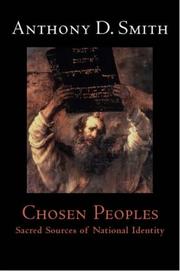
ISBN: 0192100173 9780192100177 Year: 2003 Publisher: Oxford Oxford university press
Abstract | Keywords | Export | Availability | Bookmark
 Loading...
Loading...Choose an application
- Reference Manager
- EndNote
- RefWorks (Direct export to RefWorks)
'Unto thy seed I have given this land.' From the moment of God's covenant with Abraham in the Old Testament, the idea that a people are chosen by God has had a central role in shaping national identity. Chosen Peoples argues powerfully that sacred belief remains central to national identity, even in an increasingly secular, globalized modern world. In this important new study, Anthony D. Smith goes in search of the deep Judeo-Christian roots of the many manifestations of national identity. This rich and timely contribution to current debates about nationalism explains the complex historical reasons behind often violent modern conflicts around issues of land, culture, religion, and politics. Tracing the development of individual nations over many centuries, it offers fascinating insights into the religious and cultural foundations of countries such as Great Britain, the United States, Israel, France, and Germany. The argument draws on a wide range of examples from historic landscapes in Ireland, Switzerland and Egypt, myths of Arthurian Britain, Holy Russia, and Byzantium, through memories of a 'Golden Age', to the modern commemoration of the 'Glorious Dead', and of victims of war.
Covenants --- Election (Theology). --- Messianism, Political. --- Nationalism --- Political messianism. --- Religious aspects. --- Election (Theology) --- Alliances (Religion) --- Election (Théologie) --- Messianisme politique --- Election (Théologie) --- Political messianism --- Messianism, Political --- Messianism --- Nationalism and religion --- Predestination --- Salvation --- Covenants (Religion) --- Religious aspects --- Christianity --- Nationalisme --- Aspect religieux
Book
ISBN: 9782806105936 2806105935 Year: 2021 Publisher: Louvain-la-Neuve Académia
Abstract | Keywords | Export | Availability | Bookmark
 Loading...
Loading...Choose an application
- Reference Manager
- EndNote
- RefWorks (Direct export to RefWorks)
Pour les scientifiques, le monde est gouverné par des lois observables dans les phénomènes naturels et formulables par les mathématiques. Einstein a parlé de l'énigme que constitue le lien étroit entre les lois de l'Univers et les lois des mathématiques. La conception d'une alliance, et non d'une simple relation, entre Dieu et l'Homme, est la contribution la plus significative de la pensée hébraïque à l'histoire de l'humanité. À ces deux pactes pour les chrétiens, vient s'en greffer un troisième : celui proposé par Jésus de Nazareth, personne unique dans l'histoire de l'humanité.00Après de nombreuses années de recherche en mathématiques et en informatique, André Thayse a enseigné la logique et l'intelligence artificielle à l'Université catholique de Louvain dont il est professeur émérite.
Covenants --- Faith and reason --- God --- Alliances (Religion) --- Foi et raison --- Dieu --- Religious aspects --- Knowableness --- Cognoscibilité --- 234.23 --- 234.23 Geloof en wetenschap. Openbaring en rede --- Geloof en wetenschap. Openbaring en rede
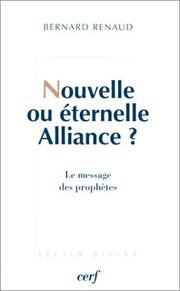
ISBN: 2204069310 9782204069311 Year: 2002 Volume: 189 Publisher: Paris Cerf
Abstract | Keywords | Export | Availability | Bookmark
 Loading...
Loading...Choose an application
- Reference Manager
- EndNote
- RefWorks (Direct export to RefWorks)
Covenants --- Alliances (Religion) --- Biblical teaching --- xEnseignement biblique --- Bible. --- Theology --- Biblical teaching. --- Theology. --- 224 --- 224 Livres prophetiques de l'Ancien Testament --- 224 Profetische boeken van het Oude Testament --- Livres prophetiques de l'Ancien Testament --- Profetische boeken van het Oude Testament --- Later Prophets --- Latter Prophets --- Neviʼim aḥaronim --- Nevym achronim --- Prophetae Posteriores --- Prophets (Books of the Old Testament) --- Yeŏnsŏ --- Covenants - Biblical teaching.
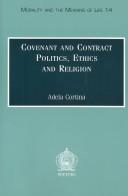
ISBN: 9042913401 9789042913400 Year: 2003 Volume: 14 Publisher: Leuven Peeters
Abstract | Keywords | Export | Availability | Bookmark
 Loading...
Loading...Choose an application
- Reference Manager
- EndNote
- RefWorks (Direct export to RefWorks)
In today's world two narrations are vital for understanding human bonds: the account of reciprocal recognition, the Covenant, as told in the book of «Genesis», extended in the works of G.H. Mead, dialogical personalism and discourse ethics; and the Contract, as this is expounded in Hobbes' «Leviathan», which continues to be seen in all kinds of hues in the liberal tradition. The Aristotelian account of the republic, of the political community "prior" to any other form of community would seem to be connected with these. Covenant, Republic and Contract would thus become the three formulae for understanding human bonds. Israel, Athens (or the Italian renaissance republics) and London would be their countries of origin. Modern republicanism nevertheless turns liberal and opts for the contract between independent beings as «fiat» of the political world.But the contract is not self-sufficient, since anyone who looks back to their roots will come to the narration of reciprocal recognition. The Covenant falls similarly short, as those who forget the parable of independence may well have a disregard for justice. In a dialogue with the most relevant philosophical currents of the age, the book proposes an articulation of politics, ethics and religion appropriate for our own time, starting from the contract between independent beings and from the reciprocal recognition of those who know themselves to be human.
Christelijke ethiek --- Ethique chrétienne --- Philosophie politique --- Politieke filosofie --- Civil society --- Social contract --- Covenants --- Political ethics. --- Société civile --- Contrat social --- Alliances (Religion) --- Morale politique --- Moral and ethical aspects. --- Religious aspects. --- Religious aspects --- Aspect moral --- Aspect religieux --- -Social contract --- -Covenants --- -Political ethics --- Ethics, Political --- Ethics in government --- Government ethics --- Political science --- Politics, Practical --- Ethics --- Civics --- Agreements --- Social compact --- Consensus (Social sciences) --- Sociology --- Sovereignty --- Moral and ethical aspects --- Political aspects --- Société civile --- Political ethics --- Covenants - Religious aspects. --- Religion and politics.
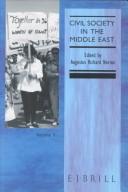
ISBN: 9004101756 9004100377 9004103538 9004100393 9004492933 0585294720 9780585294728 9004492593 0585333602 9780585333601 Year: 1995 Volume: 50 Publisher: Leiden Brill
Abstract | Keywords | Export | Availability | Bookmark
 Loading...
Loading...Choose an application
- Reference Manager
- EndNote
- RefWorks (Direct export to RefWorks)
Civil Society in the Middle East is a project of the Department of Politics and the Koverkian Center for Near Eastern Studies, New York University. Project director is Augustus Richard Norton (Boston University). While there is wide disagreement about the outcome among those who follow events in the Middle East, there is little doubt that the regimes in the region are under increasing pressure from their citizens. In rich and poor states alike, incipient movements of men and women are demanding a voice in politics. Recent political developments in Jordan, Yemen, Lebanon, even the future state of Palestine, clearly show the vitality and dynamism of civil society, the melange of associations, clubs, guilds, syndicates, federations, unions, parties and groups which provide a buffer between state and citizen and which are now so clearly at the forefront of political liberalization in the region. Civil Society in the Middle East , a two-volume set of papers providing an unusually detailed and rich assessment of contemporary politics within the Middle East, and in this sense alone, quite literally peerless, is the result of a project of the Department of Politics and the Kevorkian Center for Near Eastern Studies at New York University. Volume I contains contributions by Augustus Richard Norton, Raymond A. Hinnebusch, Laurie Brand, Muhammad Muslih, Mustafa Kamil al-Sayyid, Ghanim al Najjar and Neil Hicks, Eva Bellin, Jill Crystal, Saad al-Din Ibrahim, and Alan Richards.
-Covenants --- -Islam and politics --- -#SBIB:031.IO --- #SBIB:328H511 --- -Instellingen en beleid: Islamitische, Arabisch sprekende landen --- Alliances (Religion) --- Civil society --- Covenants --- Islam and politics --- Political aspects --- #SBIB:031.IO --- #SBIB:321H91 --- Agreements --- Social contract --- Niet-specifieke politieke en sociale theorieën vanaf de 19e eeuw: islam, Arabisch nationalisme --- Instellingen en beleid: Islamitische, Arabisch sprekende landen --- Middle East --- Politics and government. --- Société civile --- Islam et politique --- Aspect politique --- Moyen-Orient --- Politics and government --- Politique et gouvernement --- SOCIETE CIVILE --- MOYEN-ORIENT
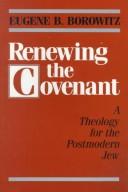
ISBN: 0827604009 Year: 1991 Publisher: New York (N.Y.): Jewish publication society
Abstract | Keywords | Export | Availability | Bookmark
 Loading...
Loading...Choose an application
- Reference Manager
- EndNote
- RefWorks (Direct export to RefWorks)
Judaism --- Commandments (Judaism) --- Covenants --- Judaïsme --- Commandements (Judaïsme) --- Alliances (Religion) --- Religious aspects --- Histoire --- 296*63 --- -Covenants --- -Judaism --- -Jews --- Religions --- Semites --- Jews --- Agreements --- Good works (Judaism) --- Mitsvah --- Mitsvot --- Mitzvah --- Mitzvot --- Precepts (Judaism) --- Jewish law --- Jewish way of life --- Joodse theologie en filosofie--in de moderne en hedendaagse tijd --- History of doctrines --- -Religious aspects --- -History of doctrines --- -Religion --- Religion --- Customs and practices --- -Joodse theologie en filosofie--in de moderne en hedendaagse tijd --- -296*63 --- 296*63 Joodse theologie en filosofie--in de moderne en hedendaagse tijd --- Judaïsme --- Commandements (Judaïsme)
Book
ISBN: 9783034307000 3034307004 Year: 2011 Volume: 7 Publisher: Oxford Lang
Abstract | Keywords | Export | Availability | Bookmark
 Loading...
Loading...Choose an application
- Reference Manager
- EndNote
- RefWorks (Direct export to RefWorks)
This text examines economic life from a theological point of view, posing a theological challenge to contemporary economic life through a re-discovery of the historical roots of the theological covenant in society.
Social ethics --- Religious studies --- Economics --- Covenants --- Contracts. --- Economie politique --- Alliances (Religion) --- Contrats --- Religious aspects --- Christianity. --- Christianity --- Aspect religieux --- Christianisme --- Contracts --- -Covenants --- -AA / International- internationaal --- 18 --- 174 --- 322 --- 241.67 --- Agreements --- Contract law --- Contractual limitations --- Limitations, Contractual --- Commercial law --- Legal instruments --- Obligations (Law) --- Juristic acts --- Liberty of contract --- Third parties (Law) --- Economic theory --- Political economy --- Social sciences --- Economic man --- -Christianity. --- Godsdienst --- Verband tussen de ethiek en de economie. Ethiek en bedrijf. --- de Staat en de kerk. Godsdienstbeleid. Sociale rol van de kerken. --- Business ethics. Corporate ethics. Bedrijfscodes. Management en ethiek. Zakenmoraal --- Law and legislation --- 241.67 Business ethics. Corporate ethics. Bedrijfscodes. Management en ethiek. Zakenmoraal --- AA / International- internationaal --- Religious aspects&delete& --- Verband tussen de ethiek en de economie. Ethiek en bedrijf --- de Staat en de kerk. Godsdienstbeleid. Sociale rol van de kerken --- Christianity and economics --- Economics - Religious aspects - Christianity --- Covenants - Religious aspects - Christianity
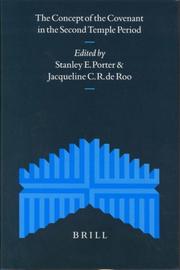
ISBN: 9004116095 9004497048 9789004116092 9789004497047 Year: 2003 Volume: 71 Publisher: Leiden: Brill,
Abstract | Keywords | Export | Availability | Bookmark
 Loading...
Loading...Choose an application
- Reference Manager
- EndNote
- RefWorks (Direct export to RefWorks)
During the reign of Cyrus the Great, founder of the Achaemenid Empire, the Jews returned to Jerusalem to rebuild the temple. This Second Temple period is characterised by a changing mode of thinking. This volume traces the development of the concept of the covenant during this important era, by discussing relevant texts among the Apocrypha, such as Wisdom of Solomon; the Pseudepigrapha, especially the Dead Sea Scrolls and Jubilees; and the New Testament, such as the Pauline Letters. The authors deal with interesting concepts related to the idea of the covenant, such as law, wisdom, election, grace, the kingdom of God and even the role of food. This is an important piece of work for understanding the notion of the covenant in Judaism and Christianity, useful for theologians and historians, as well as students of the respective disciplines.
Judaism --- Covenants --- History --- Religious aspects --- History of doctrines --- 221.06 --- -Judaism --- -Jews --- Religions --- Semites --- Jews --- Agreements --- Oud Testament: hermeneutiek; exegese --- -History of doctrines --- -Religion --- Religion --- -Oud Testament: hermeneutiek; exegese --- -221.06 --- 221.06 Oud Testament: hermeneutiek; exegese --- -221.06 Oud Testament: hermeneutiek; exegese --- Hellenistic Judaism --- Judaism, Hellenistic --- Religious aspects&delete& --- Judaism&delete& --- Bible --- Dead Sea scrolls. --- Jerusalem scrolls --- ʻAin Fashka scrolls --- Jericho scrolls --- Scrolls, Dead Sea --- Qumrân scrolls --- Rękopisy z Qumran --- Shikai bunsho --- Megilot Midbar Yehudah --- Dodezee-rollen --- Kumránské rukopisy --- Documentos de Qumrán --- Textos de Qumrán --- Rollos del Mar Muerto --- Manuscritos del Mar Muerto --- Manuscrits de la mer Morte --- Dödahavsrullarna --- Kumranin kirjoitukset --- Kuolleenmeren kirjoitukset --- Qumranhandskrifterna --- Qumranin kirjoitukset --- Qumran Caves scrolls --- Criticism, interpretation, etc. --- Biblia --- Post-exilic period, 586 B.C.-210 A.D. --- Criticism, interpretation, etc --- Dead Sea Scrolls --- History and criticism --- Alliances (Religion)
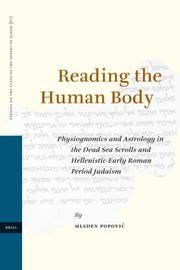
ISSN: 01699962 ISBN: 128192136X 9786611921361 9047420462 9789047420460 9004157174 9789004157170 9789004157170 9789047420460 Year: 2007 Volume: 67 Publisher: Leiden Brill
Abstract | Keywords | Export | Availability | Bookmark
 Loading...
Loading...Choose an application
- Reference Manager
- EndNote
- RefWorks (Direct export to RefWorks)
This study deals with physiognomic and astrological texts from the Dead Sea Scrolls that represent one of the earliest examples of ancient Jewish science. For the first time the Hebrew physiognomic-astrological list 4Q186 (4QZodiacal Physiognomy) and the Aramaic physiognomic list 4Q561 (4QPhysiognomy ar) are comprehensively studied in relation to both physiognomic and astrological writings from Babylonian and Greco-Roman traditions. New reconstructions and interpretations of these learned lists are offered that result in a fresh view of their sense, function, and status within both the Qumran community and Second Temple Judaism at large, showing that Jewish culture in Palestine participated in the cultural exchange of learned knowledge between Babylonian and Greco-Roman cultures.
Astrologie. --- Dode-Zeerollen. --- Essenen. --- Fysiognomiek. --- Jewish astrology. --- Physiognomy --- Astrology, Jewish --- Astrology --- Face reading --- Metoposcopy --- Characters and characteristics --- Psychology --- Face --- Pathognomy --- Phrenology --- Judaism. --- Dead Sea scrolls. --- Criticism, interpretation, etc. --- Human body --- Jewish astrology --- Judaism --- 133.52 --- 229*319 --- 229*319 Qumran en het jodendom --- Qumran en het jodendom --- 133.52 Astrologie. Horoscopen. Dierenriem --- Astrologie. Horoscopen. Dierenriem --- Body, Human --- Human beings --- Body image --- Human anatomy --- Human physiology --- Mind and body --- Hellenistic Judaism --- Judaism, Hellenistic --- Religious aspects&delete& --- History --- Religious aspects --- Zadokites --- Eschatology, Jewish. --- Midrash --- Covenants --- Jewish sects --- Jewish law --- Prophecy --- Qumran community --- Jews --- Apocalyptic literature --- Sadocites --- Eschatologie juive --- Alliances (Religion) --- Judaïsme --- Sectes juives --- Droit juif --- Prophétie --- Communauté de Qumrān --- Juifs --- Littérature apocalyptique --- History and criticism. --- Liturgy --- Interpretation and construction --- History. --- Histoire et critique --- Liturgie --- Histoire --- Interprétation --- Damascus document.
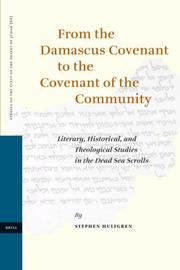
ISSN: 01699962 ISBN: 9789004154650 9004154655 9786611917227 1281917222 9047419316 9789047419310 9781281917225 6611917225 Year: 2007 Volume: v. 66 Publisher: Leiden Brill
Abstract | Keywords | Export | Availability | Bookmark
 Loading...
Loading...Choose an application
- Reference Manager
- EndNote
- RefWorks (Direct export to RefWorks)
The focus of this volume is a history of covenantal theology in the Dead Sea Scrolls. At the heart of the work the author provides new insight into the origins of the 'new covenant in the land of Damascus' ('Damascus covenant') and of the Qumran community ('covenant of the community'). The 'Damascus covenant' arose as a national restoration movement in Third century BC Palestine among Jews who traced their history back to the returnees from exile. The Qumran community emerged out of the Damascus covenant in the 2nd century BC as a refuge for the faithful when the Damascus covenant and the Teacher of Righteousness suffered the betrayal of some of their adherents. Other chapters explore the topics of dualism, the righteousness of God in the thanksgiving hymns, and covenant renewal.
Covenants --- Qumran community. --- Religious aspects --- Judaism. --- Dead Sea scrolls. --- Damascus document. --- 229*317 --- 229*316.1 --- 229*316.1 Qumran-teksten: Damascusdocument; Gemeenteregel; Hôdayot/Hymnen; Oorlogsrol --- Qumran-teksten: Damascusdocument; Gemeenteregel; Hôdayot/Hymnen; Oorlogsrol --- 229*317 Qumran en het Oude Testament --- Qumran en het Oude Testament --- Kumran community --- Jewish sects --- Essenes --- Covenants (Jewish theology) --- Zadokite documents --- Document of the new covenant in the land of Damascus --- Book of covenant of Damascus --- Damascus covenant --- Midrash on the eschatological Torah --- Midrash ha-Torah ha-aḥaron --- New Damascus document --- Jerusalem scrolls --- ʻAin Fashka scrolls --- Jericho scrolls --- Scrolls, Dead Sea --- Qumrân scrolls --- Rękopisy z Qumran --- Shikai bunsho --- Megilot Midbar Yehudah --- Dodezee-rollen --- Kumránské rukopisy --- Documentos de Qumrán --- Textos de Qumrán --- Rollos del Mar Muerto --- Manuscritos del Mar Muerto --- Manuscrits de la mer Morte --- Dödahavsrullarna --- Kumranin kirjoitukset --- Kuolleenmeren kirjoitukset --- Qumranhandskrifterna --- Qumranin kirjoitukset --- Qumran Caves scrolls --- Alliances (Religion) --- Communauté de Qumrān --- Judaïsme --- Qumran community --- Agreements --- Religious aspects&delete& --- Judaism --- Damascusdocument. --- Dode-Zeerollen. --- Verbond. --- Covenants - Religious aspects - Judaism.
| Listing 1 - 10 of 10 |
Sort by
|

 Search
Search Feedback
Feedback About UniCat
About UniCat  Help
Help News
News